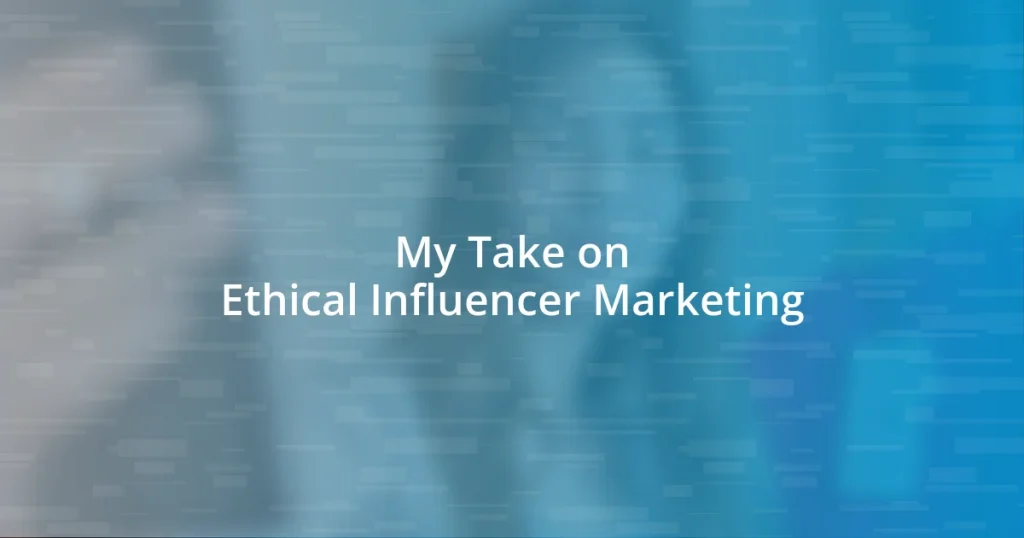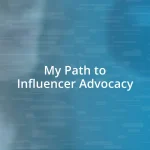Key takeaways:
- Ethical influencer marketing thrives on authenticity and transparency, building trust and loyalty through genuine storytelling and shared values.
- Identifying ethical influencers involves assessing their engagement with audiences, alignment with personal values, and openness about partnerships.
- Successful ethical campaigns leverage storytelling and community engagement while measuring impact through engagement metrics and sentiment analysis.
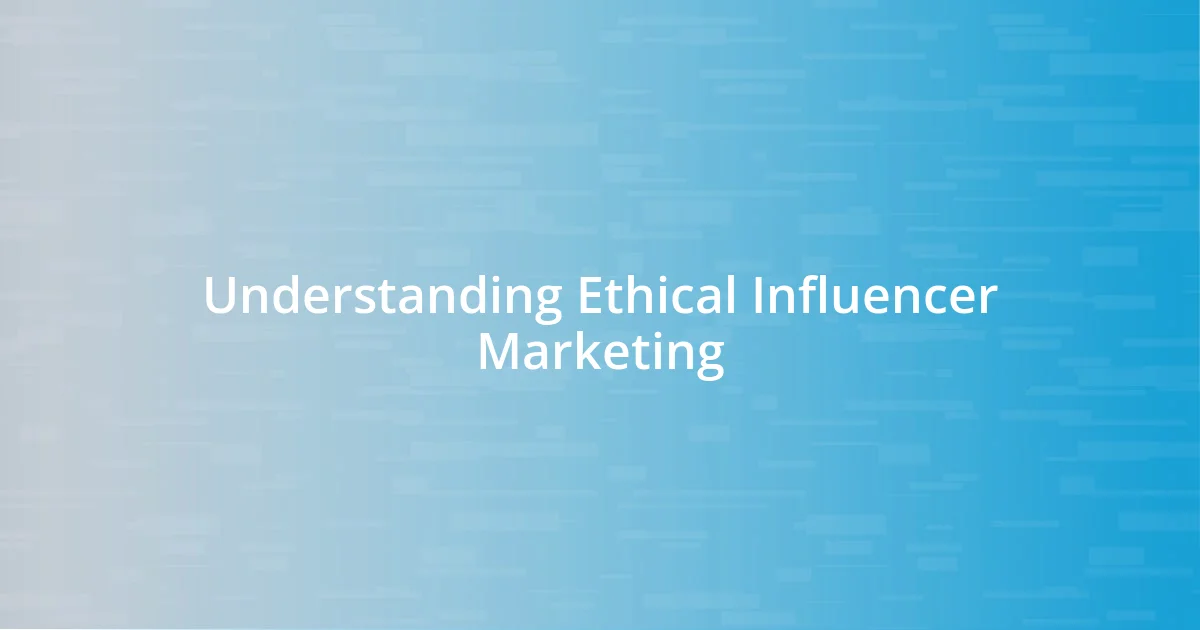
Understanding Ethical Influencer Marketing
Ethical influencer marketing revolves around authenticity and transparency. I remember a campaign I followed where the influencer openly shared their partnership with a brand, explaining why they chose to work with them. That level of honesty not only made me trust the influencer more but also sparked my curiosity about the products they were promoting.
It’s about aligning values too. When influencers support brands that resonate with their personal beliefs, it creates a genuine connection with their audience. Have you ever bought a product simply because you resonated with the influencer’s story behind it? I have, and it felt satisfying, as if I was joining a community of like-minded individuals.
At its core, ethical influencer marketing enhances audience engagement by fostering meaningful relationships. When influencers promote products they genuinely believe in, it creates a ripple effect of trust and loyalty among their followers. I often find myself reflecting on how this approach feels not just like marketing, but like an invitation to join a shared journey of discovery.
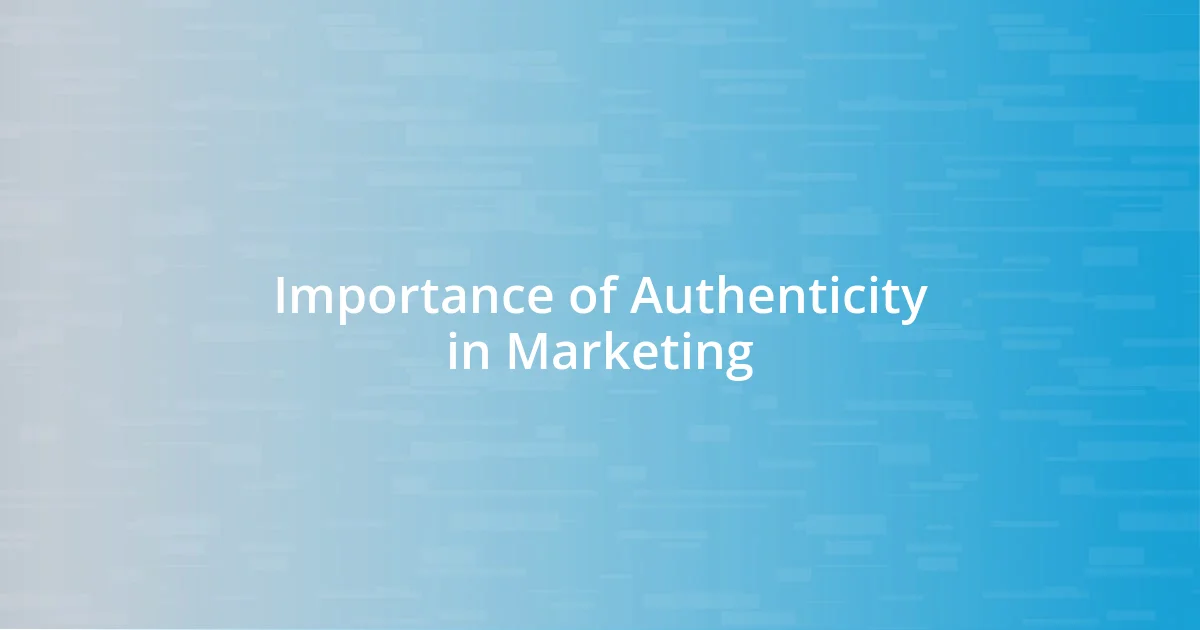
Importance of Authenticity in Marketing
Authenticity in marketing isn’t just a trend; it’s a necessity. I often think about a time when I came across a skincare influencer. They posted a raw, unedited video discussing their personal struggles with skin issues and how a specific product genuinely helped them. That moment felt real and relatable. It reminded me that behind the polished images and sales pitches, there are actual people sharing their experiences. This kind of honest storytelling resonates deeply, making me more open to trying their recommendations.
- Authenticity builds trust; when influencers are genuine, audiences feel safer.
- Real experiences create emotional connections, leading to higher engagement.
- When a brand or influencer communicates transparently, it fosters loyalty and an ongoing relationship.
- Authenticity encourages meaningful dialogue between influencers and their followers, generating a more vibrant community.
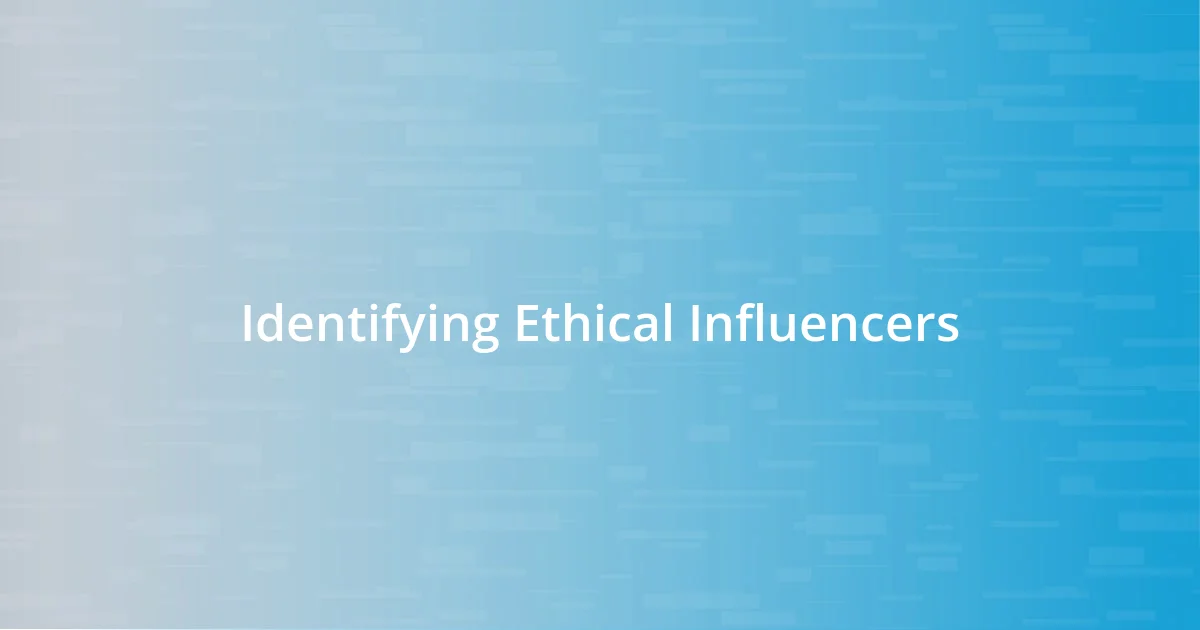
Identifying Ethical Influencers
Identifying ethical influencers can feel daunting, but there are key signs to look for. I recall when I first started following a nutrition influencer who regularly shared details about their personal journey, including struggles and victories. Their willingness to discuss challenges made me feel that I could trust their guidance because it was grounded in real experiences, not just polished marketing.
One critical aspect is the influencer’s engagement with their audience. I once interacted with an eco-friendly lifestyle influencer who responded genuinely to comments, nurturing a community of like-minded individuals. Their transparent conversations felt less like a one-way broadcast and more like a collaborative environment, which solidified my trust in their recommendations.
To streamline the process of identifying ethical influencers, I recommend assessing their alignment with values, transparency in partnerships, and level of authenticity. This approach not only highlights their ethical stance but also enhances your own awareness of the brands and influencers you support.
| Criteria | Indicators |
|---|---|
| Values Alignment | Supports brands that match their personal values |
| Transparency | Openly discloses partnerships and sponsorships |
| Authenticity | Shares personal stories and engages genuinely with followers |
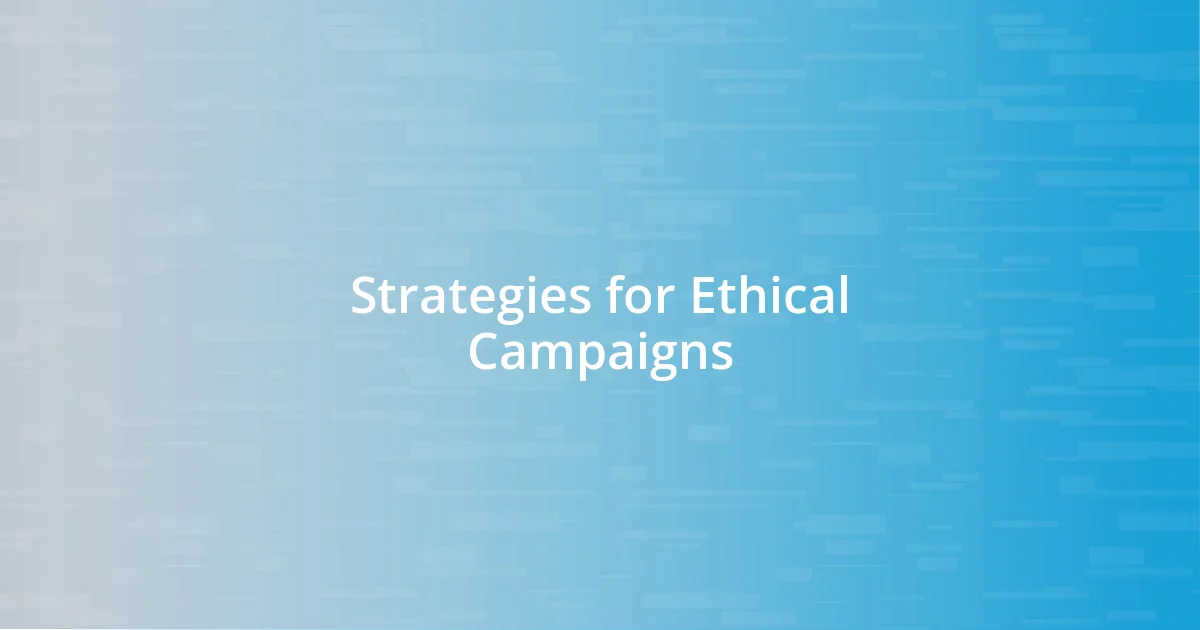
Strategies for Ethical Campaigns
When it comes to crafting ethical campaigns, I believe storytelling plays a pivotal role. I recently came across a brand that ran a campaign focusing on sustainable fashion. Rather than solely promoting products, they shared stories from the artisans who created them. This not only highlighted the craftsmanship but also humanized the brand, allowing me to connect more deeply with what I was purchasing. Have you ever felt a stronger connection to a product after learning about the people behind it? I certainly have.
Engaging followers directly is another key strategy for maintaining ethical standards. I remember participating in a Q&A session with an influencer who shared their journey with mental health. They didn’t shy away from discussing the challenges they faced, making them incredibly relatable. This transparency encouraged a two-way conversation, where community members felt comfortable sharing their own stories. How often do we see campaigns that foster such interactive dialogues? They are essential for building authentic relationships.
Additionally, setting clear guidelines for how products will be promoted is crucial. I once collaborated with a wellness brand that insisted on full transparency regarding sponsored posts. This included clear statements about sponsorships and product placements. Knowing that I was promoting something I genuinely believed in, without hidden agendas, not only boosted my confidence but also fostered trust among my followers. Don’t we all appreciate honesty in advertising? By maintaining this level of integrity, campaigns can resonate more meaningfully with audiences.
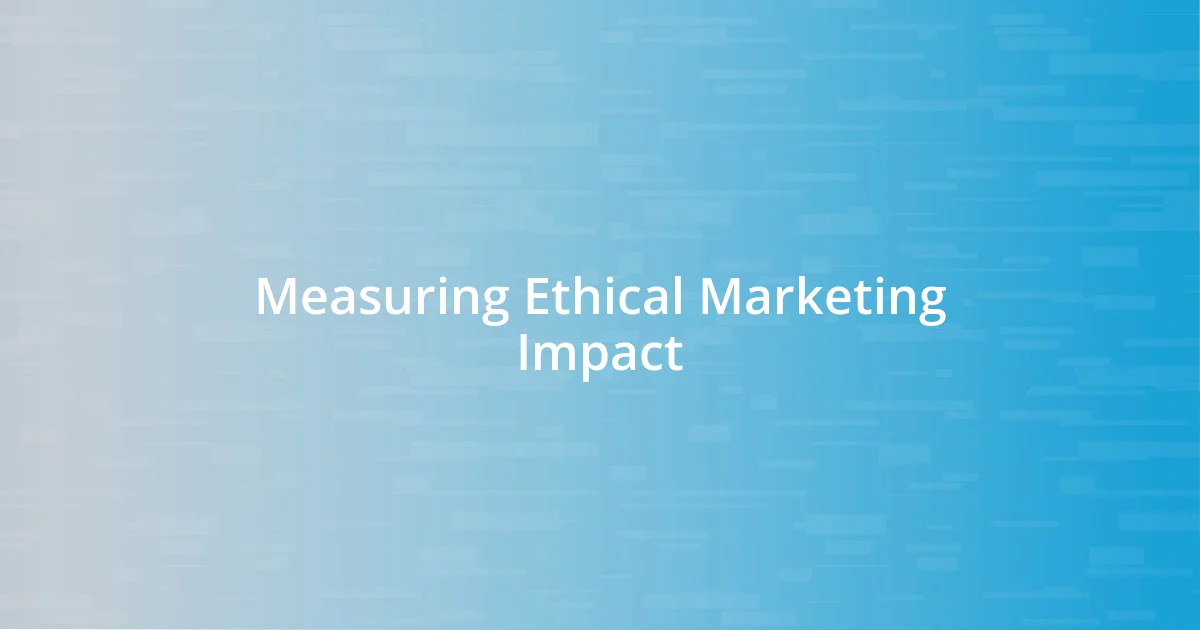
Measuring Ethical Marketing Impact
To measure the impact of ethical marketing, I’ve found that tracking engagement metrics can reveal how well a message resonates with the audience. One time, I launched a small campaign promoting a local charity through an influencer partnership. The comments and shares were overwhelmingly positive, showcasing not only community appreciation but also a significant increase in donations. Don’t you think that genuine interactions like these reflect a deeper connection beyond mere numbers?
Another approach I’m passionate about is assessing sentiment analysis. By analyzing the language used in social media discussions, we can gauge how audiences feel about a brand and its ethical stance. I remember a brand that addressed sustainability issues in their marketing. The overwhelmingly positive posts that celebrated their commitment made it clear that consumers were eager to support businesses that act responsibly. Isn’t it empowering to see people rally behind brands that align with their values?
Lastly, it’s essential to explore conversion metrics alongside traditional KPIs. For instance, I once participated in a campaign highlighting fair trade products, and we monitored the purchasing behavior of our audience closely. Not only did we see an increase in sales, but consumers also expressed a desire to learn more about ethical sourcing. This dual approach of tracking not only direct sales but also customer education can provide a more comprehensive view of the ethical marketing impact. Have you ever considered how these different metrics can shape your understanding of a campaign’s success?

Building Long-Term Relationships
Building long-term relationships in the realm of influencer marketing is essential for sustainable success. I recall a particular instance where I reached out to a fellow content creator after a campaign we both participated in. Instead of treating that collaboration as a one-off event, we decided to keep the conversation going, sharing ideas and our experiences in ethical marketing. Over time, this led to mutual support, which not only enriched our content but strengthened our credibility within our communities. Have you ever nurtured a relationship with someone that blossomed into something unexpected?
Trust is the cornerstone of any enduring relationship, especially in influencer marketing. I once worked with a skincare brand that prioritized genuine feedback from their endorsers. Instead of demanding rave reviews, they encouraged influencers to provide honest opinions about their products. This approach resonated deeply with my followers and built a layer of authenticity that captured interest. Isn’t it refreshing when a brand values your voice as much as the partnership itself?
Furthermore, consistency in communication cultivates loyalty among followers. I’ve learned that sharing periodic updates and engaging with audiences through regular Q&A sessions makes them feel included in the journey. On one occasion, after sharing my experiences with a product line, I was flooded with questions and insights from my followers. Their enthusiastic participation created a sense of community that extended beyond the initial campaign. Don’t you find that engaging in a shared dialogue can elevate the connection you have with your audience?

Case Studies of Success
One standout case that comes to mind is a collaboration with a fitness influencer who promoted a sustainable athletic wear brand. After we shared workouts featuring their activewear, user-generated content started pouring in. It was incredible to see followers not just mimicking the workouts, but also embracing the brand’s eco-friendly mission, truly becoming part of the community. Can you imagine the impact of turning customers into brand advocates who genuinely care about sustainability?
Another effective campaign I participated in involved a beauty brand committed to cruelty-free products. The influencer in this case hosted a live Q&A about the importance of ethical choices, passionately discussing how the brand supports animal rights. I remember the heartfelt responses from viewers detailing their own journeys toward cleaner beauty products. Isn’t it fascinating how such personal stories can ignite a movement and create a ripple effect among audiences?
A particularly inspiring example is when a non-profit partnered with micro-influencers to spread awareness about mental health. We created content that encouraged open discussions, which snowballed into a larger online conversation. The engagement on those posts was off the charts, but what truly moved me was seeing people share their stories and support one another. It makes me wonder, how can we further harness these personal connections to spark change in other sectors?











